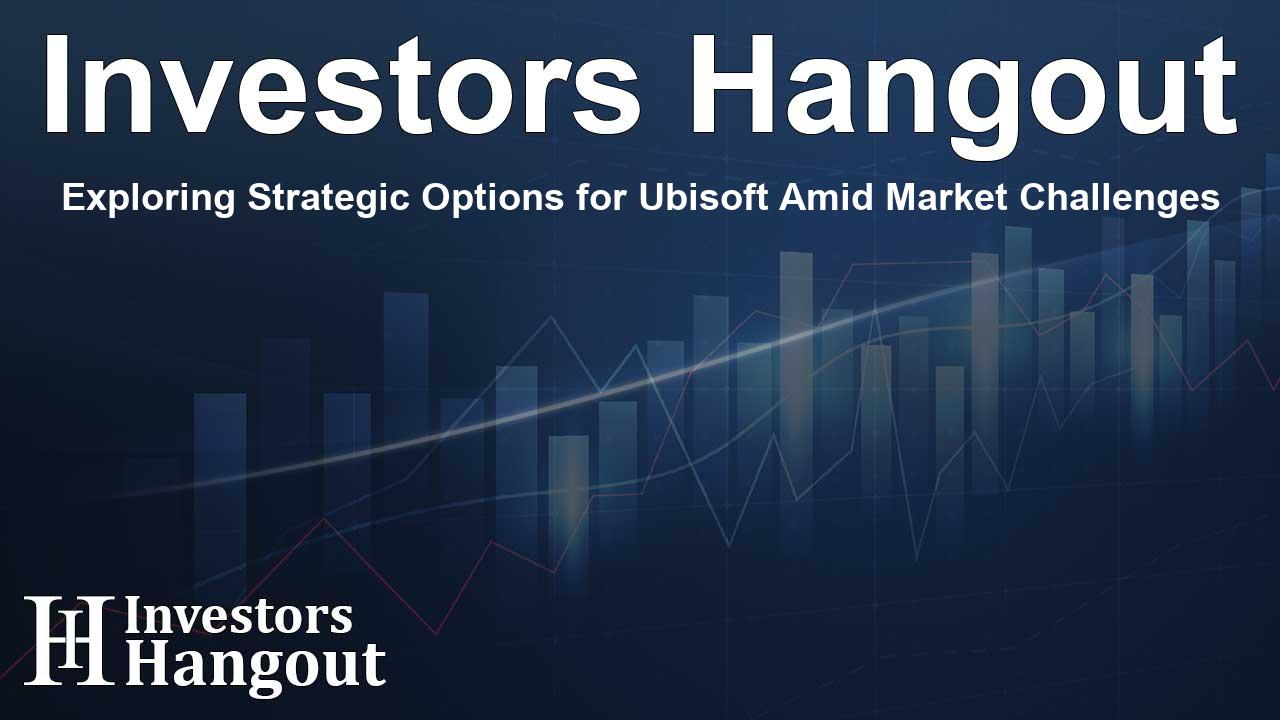Exploring Strategic Options for Ubisoft Amid Market Challenges

Strategic Discussions for Ubisoft's Future
Recent developments in the gaming industry have brought Ubisoft Entertainment SA into the spotlight as Tencent Holdings Ltd. collaborates with the Guillemot family's founders on possibilities for a buyout. Amidst a turbulent year where the company's market value plummeted, discussions are taking place to explore viable strategies to stabilize the beleaguered video game developer.
Understanding the Market Dynamics
Ubisoft's shares experienced a striking rebound, surging up to 33% following the news of these discussions, marking the most significant increase since the firm went public in 1996. However, amid ongoing challenges, the company's stock has faced a downturn of approximately 40% over the past year, with its current market capitalization hovering around €1.8 billion ($2 billion). This predicament reflects deeper underlying market dynamics and investor sentiments regarding video game companies.
Current Ownership Structure
As of now, Tencent holds 9.2% of Ubisoft's net voting rights, while the Guillemot family maintains a slightly larger stake at about 20.5%. Despite the recent stock decline, interest from minority shareholders, including AJ Investments, has surged as they advocate for a decisive move towards either a take-private bid or seeking a strategic investor.
What’s at Stake for Ubisoft?
With talks at an early stage, the outcomes remain uncertain. However, the motivations behind this interest are clear: seeking stability and value procurement for a company that has struggled with production delays and a nuanced post-pandemic recovery. Ubisoft's challenges are magnified by a recent missed earnings outlook, leading to investor apprehension.
Potential Routes for Ubisoft
The path forward involves weighing multiple strategies, including taking the company private, a move that might appease shareholder activism while streamlining operational focus. Current explorations by Tencent and the Guillemot family signify a keen interest in revitalizing Ubisoft’s fortunes and reconnecting with a gaming audience eager for innovative releases.
Market Comparisons and Insights
The landscape for video game companies has drastically changed, especially with rivals pushing forth aggressive acquisition strategies and significant investments. Firms like Blackstone Inc. and KKR & Co. were previously intrigued by potential bids for Ubisoft. In 2022, a partnership was formed between the Guillemots and Tencent, indicating a proactive approach to governance and market competition.
Reflection on Past Decisions
This partnership was insightful; capping Tencent's stake made sense for maintaining control over critical decisions within Ubisoft while equipping the family with resources amid evolving industry demands. Noteworthy is the stipulation preventing Tencent from selling its shares for five years, a strategy designed to empower the Guillemots while fostering trust among shareholders.
Current Market Sentiment
The gaming industry is notorious for its volatility. Ubisoft's recent plummet in stock value has not gone unnoticed, resulting in scrutiny from both investors and market analysts. Many feel that the company’s outlook, which has recently been influenced by factors such as a delay in the much-anticipated Assassin’s Creed title, reflects deeper strategic missteps.
In response to these challenges, stakeholders are leaning into innovative solutions that could potentially alter Ubisoft's trajectory. There is a palpable sense of urgency in the air as discussions evolve into deeper strategy sessions aimed at identifying paths to enhance value.
Final Thoughts
As developments within Ubisoft unfold, stakeholders remain vigilant. The ripples created by Tencent and the Guillemot family’s interest mark a critical juncture for the company. The future rests on striking a balance between visionary gaming and robust financial strategies that resonate with investors and gamers alike.
Frequently Asked Questions
What sparked the discussions between Tencent and the Guillemot family?
The discussions stem from recent dramatic shifts in Ubisoft's market value, where significant stock depreciation has raised concerns among stakeholders about the company's future.
How have Ubisoft's stock prices changed recently?
Ubisoft's stock has faced approximately a 40% decline this year but surged by 33% following reports of potential buyout discussions.
What is Tencent's stake in Ubisoft?
Tencent currently owns 9.2% of Ubisoft's net voting rights, making it a significant minority shareholder.
What strategies are being considered for Ubisoft's future?
Among the strategies being considered are taking the company private or seeking additional strategic investments that could stabilize operations.
What challenges is Ubisoft currently facing?
Ubisoft is grappling with production delays, a disappointing earnings outlook, and heightened competition within the gaming sector, all contributing to its market struggles.
About The Author
Contact Olivia Taylor privately here. Or send an email with ATTN: Olivia Taylor as the subject to contact@investorshangout.com.
About Investors Hangout
Investors Hangout is a leading online stock forum for financial discussion and learning, offering a wide range of free tools and resources. It draws in traders of all levels, who exchange market knowledge, investigate trading tactics, and keep an eye on industry developments in real time. Featuring financial articles, stock message boards, quotes, charts, company profiles, and live news updates. Through cooperative learning and a wealth of informational resources, it helps users from novices creating their first portfolios to experts honing their techniques. Join Investors Hangout today: https://investorshangout.com/
The content of this article is based on factual, publicly available information and does not represent legal, financial, or investment advice. Investors Hangout does not offer financial advice, and the author is not a licensed financial advisor. Consult a qualified advisor before making any financial or investment decisions based on this article. This article should not be considered advice to purchase, sell, or hold any securities or other investments. If any of the material provided here is inaccurate, please contact us for corrections.
